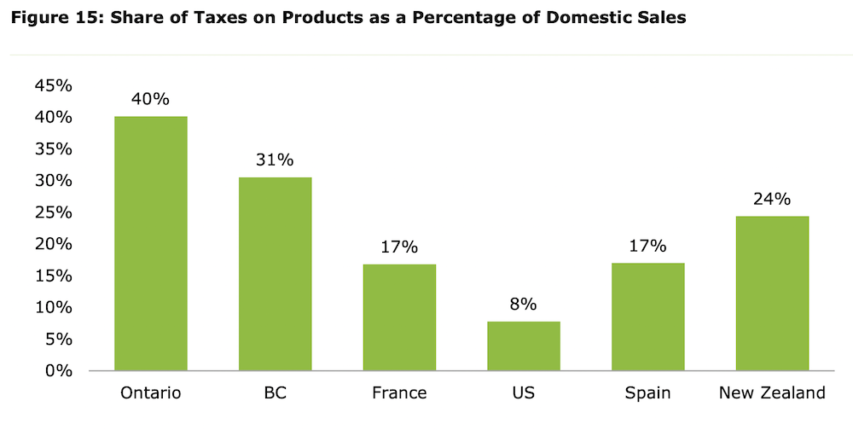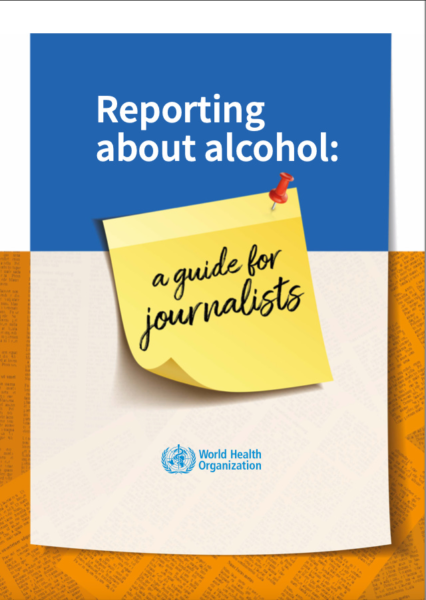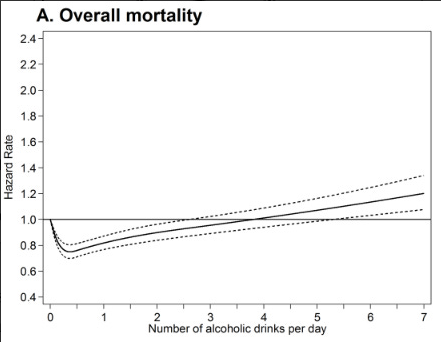A better way to grasp the essence of something is to look at the bigger picture. Over years of tasting, I’ve been drawn to a direct approach, which consists of jumping into the middle of things. I’ve found that if you start on the outside you often cannot get to the heart, and this is where you want to be. Some of the best descriptions of wine have come from people who could not analyze a wine to save their lives. They simply give an honest response to an experience just as someone would give to a Rolling Stones concert. Or, as Matisse said, they “observed … and felt the innermost nature of the experience.” Many people have difficulty doing this with wine because they believe there is a proper wine language and a correct response to each wine. They fear giving the wrong response.
Billy Munnelly, Billy’s Best Wines for 2005.
June 26, 2024
QotD: Wine criticism
June 7, 2024
QotD: Wine labels
One cannot fail to notice the contemporary marketing of wines by means of fun-and-funky labels, with their fractal curves, tropical fruit juice colors, and animals designed to appeal to the inner child, that cretinous monster who lurks inside us all. There is an undeniable increase in animals, for example, on wine labels, a trend which is bound to grow. All one can do to protest this development is to point out that the quality of a wine is probably in inverse proportion to the ferocity of the animal on its label. Beware, therefore, of labels with eagles, tigers, or bears (though I have not yet seen sharks, leopard seals, or velociraptors, it is only a matter of time).
Lawrence Osborne, The Accidental Connoisseur: An Irreverent Journey Through the Wine World, 2004.
May 29, 2024
Ontario’s long and winding (and subsidy-strewn) road to beer in convenience stores
Apparently I’ll have a little bit more to celebrate on my birthday this year as the Ontario government’s glacially slow-to-change alcohol sales rules are being liberalized as of September 5th to allow all the province’s convenience stores to begin selling beer and wine:
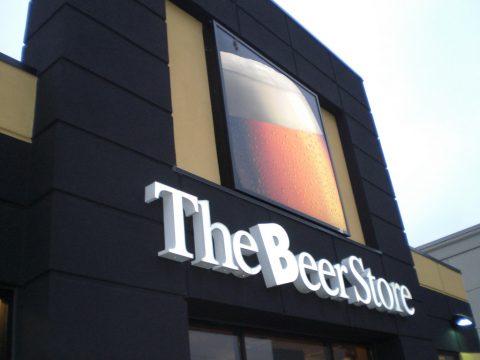
“The Beer Store” by Like_the_Grand_Canyon is licensed under CC BY-NC 2.0
Premier Doug Ford promised Ontarians beer in corner stores, supermarkets and big-box stores, and by God he has delivered. As of Sept. 5, all Ontario convenience stores meeting eligibility criteria will be allowed to sell beer, wine, cider and pre-mixed drinks. As of Oct. 31, the privilege will be extended to all grocery and big-box stores. The province says it expects as many as 8,500 new booze-procurement sites to come online under the new regime. By Ontario standards, it’s absolutely revolutionary.
The new regime is also, of course, hilariously complicated. And absurdly, offensively expensive.
It is fair to describe the new regime as somewhat more competitive, and certainly more convenient. In addition to offering potentially thousands of new locations, supermarkets (including the roughly 450 already licensed) will be able to offer volume discounts on beer — i.e., a 24-pack will cost less per bottle than a six-pack. This was a privilege hitherto reserved for The Beer Store, the American-, Belgian- and Japanese-owned conglomerate that dominated beer sales in Ontario from the end of Prohibition until fairly recently.
Private retailers will even be able to set their own prices, which until now has been considered blasphemy.
It is not fair to describe the new regime, as the government does, as an “open” market.
Near as I can tell, Ontario will by 2026 have the following retail environments in place:
- The Beer Store. Smelly, surly, and the best-available value. Only beer — no cider or mixed drinks. It’s in the name.
- LCBO locations. Government-run liquor stores retain their near-absolute monopoly on hard liquor sales, in addition to selling beer (especially craft beer, in which The Beer Store’s owners aren’t so interested), wine and everything else.
- LCBO- and/or The Beer Store-branded “agency stores” in rural areas, which sell everything the LCBO does, but operate inside of convenience stores, small supermarkets and other local businesses, and are staffed by non-government employees.
- The existing supermarkets licensed to sell beer, cider and wine (and in rare cases all three!), plus scores of new outlets — the new 8,500 new locations.
The Beer Store maintains a monopoly (in urban areas) on wholesale for bars and restaurants and on refunding cans and bottles, although its new “master framework agreement” (MFA) doesn’t even oblige it to maintain its current number of locations — which in urban areas have been dwindling rapidly. I’m a 17-minute walk from my nearest Beer Store. The house I grew up in, in the heart of midtown Toronto, is a 45-minute walk. I’m not schlepping a leaky garbage bag full of empty cans either distance.
QotD: Wine
“I don’t mean to sound cynical,” [Antonio Terni] said as he tipped the Conero sideways for a moment and eyed the tint. “But I do hate all this pseudo-intellectual mental masturbation about wine. I make two wines: one for Americans and one for myself. They’re both fine.”
Lawrence Osborne, The Accidental Connoisseur, 2004.
March 4, 2024
QotD: The “ABC” movement in wine
Back in the 1990s when I first got into wine, there was a movement against the growing homogenisation of the world’s wine called ABC: “anything but chardonnay” which handily also stood for “anything but cabernet”. This was at a time when growers from Piedmont to Penedès were planting chardonnay (or cabernet sauvignon for reds) instead of local grape varieties.
There was a worry that in the future all wine would taste the same while the more obscure varieties would disappear. As an ABC enthusiast, I thought it far better and more interesting to drink riesling, or fiano or albariño or esgana cão (a Madeiran grape that means “dog strangler” in Portuguese because of its ferociously high acidity).
Jancis Robinson was also not a chardonnay fan. Recently I’ve been watching her Wine Course made in the 1990s on YouTube. It still holds up well, and the budget by modern standards is mind-blowing; one moment she’s in Burgundy, the next she’s in Australia.
Can we have another series like this again soon please? Each episode is devoted to a grape and in the chardonnay one Jancis (she’s one of the few famous people who it is acceptable to refer to by just her first name, like Britney or Boris) can barely contain her contempt for many wines made from the variety describing them as “sugar water”. She’s also not keen on the world’s second favourite variety, sauvignon blanc, either.
I was with Jancis. In fact, I was with Jancis on most things which points to a possible explanation for my chardonnay conversion. When I started out, I hadn’t developed my own tastes and so I was buying wine that I thought sounded sophisticated — such as Mosel riesling.
But as I’ve got older, I’m now buying bottles purely because I like them. Furthermore, I cook and entertain a lot more than I did when I was in my twenties and chardonnay, especially white Burgundy, goes with pretty much anything. If you don’t know what to order when eating out then a bottle of Mâcon-Villages will cover all your bases (the red equivalent if you’re interested is a bottle of Beaujolais).
But also your average chardonnay has got a lot better since the ’90s, or perhaps I should say that it leans more towards my tastes. I’ve been watching a lot of old episodes of Frasier recently and the chardonnay they drink is nearly orange. This style which is still very popular in the US is based on very ripe, some might say overripe, grapes which are then treated to a pre-fermentation maceration to get colour and body out of the skins.
Following fermentation with a yeast which accentuates tropical fruit flavours, the wine would be perked up with some tartaric acid and then either aged in new oak casks or more likely for cheaper wines have oak chips added.
The finished product would be thick and syrupy with a deep golden colour. Not very chic but a revelation in 1980s Britain when everyday white wine meant Blue Nun or Black Tower. They’re what Oz Clarke called “bottled sunshine” in his colourful slots with Jilly Goolden on BBC2’s Food and Drink programme. Like those loud waistcoats everyone thought were so witty worn with a morning suit or dinner jacket, they were great fun then but a bit embarrassing now.
Henry Jeffreys, “Chard: an apology”, The Critic, 2023-11-14.
February 24, 2024
Feeding Napoleon – Chicken Marengo
Tasting History with Max Miller
Published Nov 21, 2023
(more…)
January 30, 2024
The foul “nudgers” are at it again at Cambridge
Christopher Gage reports on a recent fun-reducing experiment by paid psychological meddlers at Cambridge University:
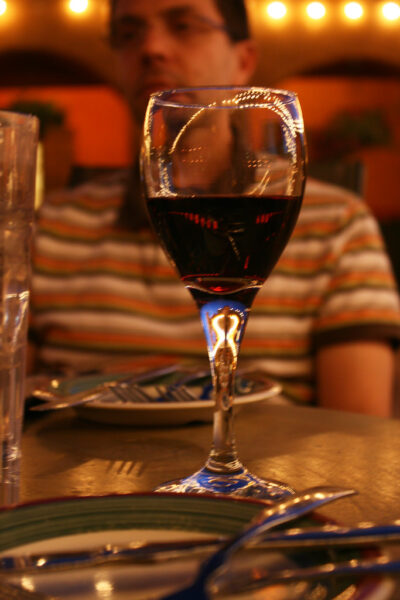
“Wineglass” by quinn.anya is licensed under CC BY-SA 2.0 .
Researchers found they could “nudge” people into drinking less wine when they denied the unsuspecting blighters a large 250ml measure.
Last summer, these wholly well-adjusted people convinced 21 Cambridgeshire pubs and restaurants to offer only small or medium glasses of wine. The result left the boffins breathless. But sadly, not in the medical sense of the word.
When denied a large, vivifying glass of wine, the subjects drank eight percent less than usual, and the pubs didn’t lose any money — smaller measures cost more. Puritans: two. Oenophiles: nil.
The usual suspects cooked up this obscene waste of time and money. Professor Dame Theresa Marteau, director of the behaviour and health research unit at Cambridge University, boasts lurid form in control freakery.
Her previous studies read like an almanac of neurotic impulses. The mad mullah dreams of shrinking plates and sinking sodas. This finger-wagger-in-chief obsesses with the vinous, porcine masses and what they may slip into their faces when she’s not looking. Marteau chillingly laments that large wine glasses “increase the pleasure of drinking wine”.
The fundamentally nosey swear these are the first murmurs of Utopia. Next, they’ll bend boozing regulations into a truncheon to batter the gastronomic swine over its head. They don’t stop. First, they shrink the large glass. Then, the medium glass affects as the large. What happens next? Take a wild guess.
This is not the work of some rogue Colonel Kurtz. One Daily Telegraph writer seized on the study. Employing the presumptuous “we” beloved of oppressive minds, they offered tips to help us drink less, assuming we drink large wines only because we are weak-willed effigies desperate for professional helpers to show us what’s best for us.
Advocates of “nudging” drive themselves senseless over this psychological thimblerig. The potential to correct “undesirable” behaviour proves too great to resist. They are a species of featherless biped with which I share nothing but the right to a trial before a jury of my peers.
As I write, I’ve just returned from a five-mile jaunt with 33 pounds strapped to my back. Loading a bag with weights burns double the calories. Therefore, whatever I do after that trek is my business alone. On my desk is a large glass of Portuguese red blend. Beside that soul-tingling measure sits a smouldering, hand-rolled, menthol-tipped cigarette.
Why strangers stake their mental well-being on what others put into their bodies, I will never know. Why they wish I’d sit here choking on sparkling water and its vegetable equivalent — celery — I’ve not the foggiest of insights. All I do know, friends, is that I am not the one in dire need of a few sessions with a psychoanalyst. My professional advice: Seven letters. Vulgar slang. A phrasal verb rhyming with “duck cough”.
December 21, 2023
QotD: Wine bores
[…] I have had to deal with the incessant drone of wine bores commenting on how the wine they just bought scored 90 points or higher without actually connecting with wine on their own terms. My favourite was the one who failed to realize his Robert Parker 94-point Bordeaux was 100 per cent corked. When I mentioned that the wine seemed “a little musty” to me, he scurried off in search of Parker’s review. Returning triumphantly, he held the newsletter aloft and proclaimed “Parker doesn’t say anything about this wine smelling musty.”
Pam Droog, letter to Vines magazine, May/June 2005.
December 20, 2023
Eat Like a Medieval Nun – Hildegard of Bingen’s Cookies of Joy
Tasting History with Max Miller
Published 5 Sept 2023
(more…)
December 16, 2023
It was forty years ago today
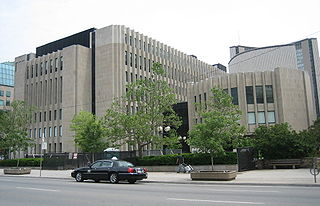 Elizabeth and I got married in Toronto on this date in 1983. It was a bit of a race to get to the courthouse on time — my so-called best man decided that he had to go back to Mississauga “for a shower” that morning, and was quite late getting back into Toronto. Trying to get a cab to hurry in downtown Toronto traffic was a waste of effort, so I very nearly missed my own wedding. Elizabeth was not pleased with me holding up the show (even though I could rightfully claim it wasn’t my fault). The rest of the day is rather a blur to me now.
Elizabeth and I got married in Toronto on this date in 1983. It was a bit of a race to get to the courthouse on time — my so-called best man decided that he had to go back to Mississauga “for a shower” that morning, and was quite late getting back into Toronto. Trying to get a cab to hurry in downtown Toronto traffic was a waste of effort, so I very nearly missed my own wedding. Elizabeth was not pleased with me holding up the show (even though I could rightfully claim it wasn’t my fault). The rest of the day is rather a blur to me now.
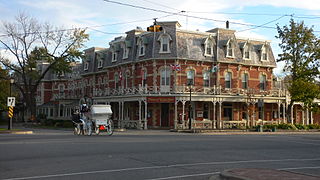 We had the reception that evening at a lovely house in the Playter Estates (during which my father tried to pick a fight with Elizabeth’s uncle), and then set off for our very brief honeymoon in Niagara-on-the-Lake the next day. We could only afford two nights at the Prince of Wales hotel, and because we got married on Saturday, we were in NOTL for Sunday and Monday nights. Back in 1983, Ontario still had fairly restrictive Sunday closing laws, so there was very little to do — almost everything was closed. (And that was probably for the best, as we had almost no money to spend anyway…)
We had the reception that evening at a lovely house in the Playter Estates (during which my father tried to pick a fight with Elizabeth’s uncle), and then set off for our very brief honeymoon in Niagara-on-the-Lake the next day. We could only afford two nights at the Prince of Wales hotel, and because we got married on Saturday, we were in NOTL for Sunday and Monday nights. Back in 1983, Ontario still had fairly restrictive Sunday closing laws, so there was very little to do — almost everything was closed. (And that was probably for the best, as we had almost no money to spend anyway…)
 One of the few businesses we found open in the area was the original Chateau des Charmes estate winery (not the huge, imposing facility of today: a small industrial-looking building a few kilometres away), where the only person on duty was Mme Andrée Bosc who gave us an exhaustive tasting experience and showed us around the winery. Neither of us were experienced wine drinkers, so this was wonderful for both of us. I’d love to say that we started our wine cellar that day, but that would only be partially true: we bought about a dozen bottles of various Chateau des Charmes wines, but we couldn’t afford to restock after those had been opened. We visited the winery every year on our anniversary for about a decade, until we got out of the habit of going back to NOTL (which was around the time our son was born).
One of the few businesses we found open in the area was the original Chateau des Charmes estate winery (not the huge, imposing facility of today: a small industrial-looking building a few kilometres away), where the only person on duty was Mme Andrée Bosc who gave us an exhaustive tasting experience and showed us around the winery. Neither of us were experienced wine drinkers, so this was wonderful for both of us. I’d love to say that we started our wine cellar that day, but that would only be partially true: we bought about a dozen bottles of various Chateau des Charmes wines, but we couldn’t afford to restock after those had been opened. We visited the winery every year on our anniversary for about a decade, until we got out of the habit of going back to NOTL (which was around the time our son was born).
After our brief honeymoon, we both had to go back to our jobs. Very shortly after that, my employer (the almost-unknown-to-Google Mr Gameway’s Ark) went bankrupt, which was financially bad timing for us, having just spent most of our tiny cash hoard on our honeymoon.
November 26, 2023
Ontario’s beer market may see radical changes soon
For beer drinkers outside Ontario, the province’s weird beer retailing rules may seem to be from a different time, but that’s only because they are. Until fairly recently, the only place to buy beer was from one of two quasi-monopoly entities: the provincially owned and operated LCBO or the foreign brewery owned Beer Store. LCBO outlets were limited to single containers and six-packs, while Beer Stores sold larger multipacks and also handled bottle deposits and returns. In the last few weeks, the Ontario government has indicated that long overdue changes are coming:

“The Beer Store” by Like_the_Grand_Canyon is licensed under CC BY-NC 2.0
The only thing we really know at this point (and it’s been reported by the Toronto Star and now CBC, and earlier by this website, all from sources) is the horribly unfair deal The Beer Store has had since 1927 in Ontario is about to come to an end. It’s expected that The Beer Store will be given notice by the end of December under the Master Framework Agreement (MFA) that the deal will be all but dead. They will have two years to wrap things up while a more modern system of booze retailing is fine-tuned and prepared for implementation. There’s a new era dawning in Ontario, one that would seemingly benefit grocery and convenience stores, local brewers, Ontario wineries, and obviously consumers who will get wider selection, more convenience and competitive pricing.
“The MFA has never been about choice, convenience or prices for customers, it has always been about serving the interests of the big brewing conglomerates, and that’s what needs to be addressed,” Michelle Wasylyshen, spokesperson for the Retail Council of Canada, whose board of directors includes members from Loblaw, Sobeys, Metro, Walmart, and Costco, told Mike Crawley of the CBC.
The end of The Beer Store MFA in whatever iteration it will look like will have a cascading impact on local VQA wine. Ontario wineries hope that it’s a positive impact and are cautiously optimistic that wide open beer and wine sales at grocery and convenience stores means more sales and less levies for their products.
As the CBC pointed out in its story, the looming reforms “pit a range of interests against each other, as big supermarket companies, convenience store chains, the giant beer and wine producers, craft brewers and small wineries all vie for the best deal possible when Ontario’s almost $10-billion-a-year retail landscape shifts. And — this is a biggie — the LCBO lobbying efforts to keep its antiquated system of monopoly retailing intact, which seems to be a big ask with what we now know from sources. Something must give.
Some key bullet points from the CBC report:
- Will the government shrink the LCBO’s profit margins, including its take from products that other retailers sell?
- Will retailers such as grocery and convenience stores be required to devote a certain amount of shelf space to Ontario-made beer and wine, or will they have total control over the inventory they stock?
- Will small Ontario wineries get any help in competing against big Ontario wineries whose products can contain as much as 75% imported wine?
The government has been listening to all stakeholders in the booze industry in Ontario for over a year now. Three key associations — Ontario Craft Wineries, Tourism Partnership Niagara, and Wine Growers Ontario — joined together to commission a report titled Uncork Ontario. That report, which concludes that the Ontario wine sector is well positioned to drive sustainable economic growth for the region, the province, and the country and has the potential to drive at least $8 billion in additional real GDP over the next 25 years, launched a campaign to lobby the government for radical changes to reach those lofty goals, or at least put the wheels in motion.
One of the big issues for Ontario wineries is a punishing 6.1% “sin” tax charged on every wine made in Ontario but not foreign wines. It’s a tax that’s been hurting Ontario wineries for years even though a grant was issued to wineries to help pay that tax back. To this date, the tax has not been cancelled and wineries keep remitting the tax owed monthly and can only hope the grant keeps getting extended. Ontario wines are among the highest taxed in the world with up to 73% of every bottle sold going to taxes and severe levies at the LCBO.
October 17, 2023
Sherry Wine of Andalucía
The Culinary Institute of America
Published 13 Nov 2012Andalucía is well known for its sherry, a fortified wine made near the town of Jerez. Sherry is a protected designation of origin; and in Spanish law, all wine labeled as “Sherry” must come from the Sherry Triangle, an area between Jerez de la Frontera, Sanlúcar de Barrameda, and El Puerto de Santa María.
For recipes, please visit http://www.ciaprochef.com/andalucia.
May 17, 2023
QotD: How do you say “Catch-22” en français?
Jean-François has two hectares of vines in our valley in South-West France: his family have been making wine here on this hard limestone soil for more than half a century. And yet, he would like nothing more than to grub up his vineyards. If you ask him why, he looks skywards, and then, with hands as gnarled as his vines, pulls out the lining of his coat-pocket. Vide. Empty.
The nectar of the gods, French wines have a reputation for being cultivated in a sun-kissed vineyard surrounding a honey-stoned chateau, owned by a Hollywood star like Leonardo DiCaprio, or a Gallic aristo whose family escaped the guillotine. Jean-François is neither. And he is not the only vigneron who is struggling. Things are far from rosé for France’s small winemakers, as two hundred militants made clear outside the Prefecture in Bordeaux one Thursday last month. They follow the thousand who protested in the city last December, when vignerons hung a human effigy outside the doors of the Bordeaux Wine Council, to raise awareness for grape-growers at risk of suicide. “Every day there is a suicide in agriculture,” Didier Cousiney, president of the Viti 33 collective informed the crowd.
In the Bordeaux area alone, 500 vignerons are looking in the bottom of the glass and seeing financial ruin. And you can add to these the growers nearing retirement who cannot find buyers for their vineyards. Like Jean-François. In the Medoc, land prices are actually sinking.
Jean-François would like to simply abandon his vines. He cannot, because it is illegal. Abandoned vines are vectors for disease, which can spread to other vineyards. Vines must be either cultivated or grubbed up. But grubbing costs €2,000 per hectare, money Jean-François does not have.
Crisis in the French wine industry affects more than viticulteurs. In France, wine is not merely a drink: it’s a national symbol, the liquid affirmation of l’Art de vivre à la française. If you opened the arteries of Marianne, you would find them coursing with a Bordeaux Appellations d’Origine Contrôlée, the official certification for wine grown in the geographical region and made with requisite skill. Until 1981, French children were allowed to drink wine in school. So, when the wine industry turns sour, France’s identity suffers a hangover.
As does its income. Wine is France’s second biggest export after aircraft, worth about €15 billion a year according to the Fédération des Exportateurs de Vins et Spiritueux de France (FEVS).
What’s going wrong in the vineyards of La Belle France? Jean-François’s eloquent gestures indicate some of the causes. Doubtless French winegrowers have been complaining about the weather since the Gauls planted the first native vines in the fifth century BC. But in the last five years, the weather has lurched from one Biblical extreme to another. We’ve had drought, which did for my own few vines last year; we’ve had flooding; we’ve had hailstorms. A late frost in April 2021 affected 80% of the nation’s vineyards.
Such was the desperation of viticulteurs then that vineyards were heated overnight with candles and paraffin heaters, to keep the frost off the delicate buds of the fruit. The sight of the vineyards of Bordeaux, the sacred centre of the French wine industry, lit by geometrically exact lines of candlelight was magnificent, but the image ultimately came to symbolise the powerlessness of humans in the face of Mother Nature. After le gel historique, there were few climate change deniers in Bordeaux’s vineyards. According to the European Environmental Agency, France is suffering the biggest economic losses caused by climate change of any country in the world. The Hexagon took a hit of €4.2 billion in 2020 due to climate change.
John Lewis-Stempel, “The bourgeois war on French wine”, UnHerd, 2023-02-01.
April 21, 2023
The Neo-Prohibitionists have taken over the World Health Organization
Christopher Snowden illustrates some of the deliberate lies promulgated by the World Health Organization’s anti-alcohol activists:
The incompetent and corrupt World Health Organisation has produced a “guide for journalists” to help hacks report on issues related to alcohol accurately. Not entirely unpredictably, it is a catalogue of anti-drinking tropes, half-truths and brazen lies. The very first words are “No amount of alcohol is safe to drink” and it doesn’t get any better thereafter.
The health benefits of moderate alcohol consumption really stick in the craw of the neo-temperance lobby and so that is where the WHO starts:
Isn’t drinking some alcohol good for your health?
No, there is no evidence for the common belief that drinking alcohol in moderate amounts can help people live longer by decreasing their risk of heart disease, diabetes, stroke or other conditions.
No evidence?! Even a casual follower of the science knows that there is at least some evidence. Those who are more familiar with the literature know that there is a huge amount of evidence built up over decades, tested and re-examined from every angle precisely because so many people in ‘public health’ don’t want to believe it.
It is inaccurate to say that “experts are divided” on whether there is no amount of healthy alcohol drinking. The scientific consensus is that any level of alcohol consumption, regardless of the amount, increases risks to health.
This is just a lie. That is not the consensus, and the only reason there isn’t unanimous agreement that moderate drinking is beneficial to health is that anti-alcohol academics such as Tim Stockwell have made it their life’s work to cast doubt on the evidence.
While several past studies did suggest that moderate consumption could, on average, promote health benefits …
Note that this immediately contradicts the claim that there is no evidence.
… newer research (1) shows that those studies used limited methodologies and that many of them were funded by the alcohol industry (2).
The first reference is a short commentary by some WHO staffers which doesn’t discuss methodologies at all. The second reference is a study which found that only 5.4 per cent of research papers in this area were funded by the alcohol industry and concluded that “the association between moderate alcohol consumption and different health outcomes does not seem to be related to funding source.”
The WHO must hold journalists in low esteem if it thinks they won’t check up the citations like this.
The dicussion [sic] about possible so-called protective effects of alcohol diverts attention from the bigger picture of alcohol harm; for example, even though it is well established that alcohol can cause cancer, this fact is still not widely known to the public in most countries (3).
The “bigger picture” is overall mortality. When all the risks are taken into account, including the small risks from a few rare cancers, do moderate drinkers live longer than teetotallers? Yes. Yes, they do.
March 10, 2023
QotD: Wine in French culture
Wine is obviously hugely central to French culture. In 1965 French adults consumed 160 litres per head a year, which perhaps explains their traditionally very high levels of cirrhosis. Despite this, they don’t have the sort of extreme oblivion-seeking alcoholism found in the British Isles. Anglo-Saxon binge drinking is considered uncouth, and the true man of panache and élan instead spends all day mildly sozzled until eventually turning into a grotesque Gérard Depardieu figure. (Although Depardieu’s 14 bottles of wine a day might be on the high side, even for French standards.)
When the French sought to reduce alcohol consumption in the 1950s, the government’s slogan was “No more than a litre of wine a day“, which must have seemed excessively nanny-statish at a time when primary school children were given cider for lunch. Wine consumption has quite drastically fallen in the decades since, by as much as two-thirds by some estimates.
Ed West, “The Frenchest things in the world … Part Deux”, Wrong Side of History, 2022-12-09.

